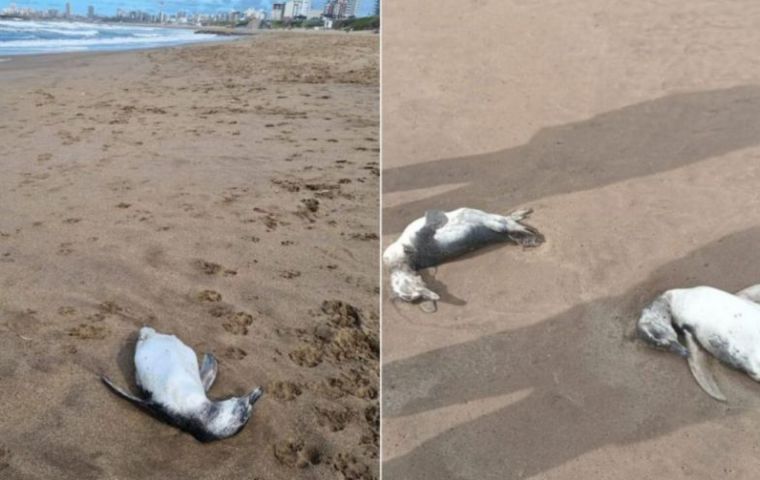MercoPress. South Atlantic News Agency
Dead penguins turn up in Mar del Plata
 These animals usually go in groups. Hence the mass deaths, it was explained
These animals usually go in groups. Hence the mass deaths, it was explained At least 40 dead penguins were found on the Camet beaches in the northern part of the beach resort and fishing industry hub of Mar del Plata. Experts say that despite its shocking effect on residents these events have been occurring every year as a result of climate change and the ensuing lack of food. The first such appearances date back to “between 2000 and 2005,” it was explained.
Fundación Fauna Argentina's Juan Antonio Lorenzani claimed that this “phenomenon” has been occurring for at least 15 years. “These birds go to the beach sick or with serious malnutrition,” he also explained as he guessed that food shortages were due to climate change or overfishing. Or both. He also said it was likely that they were rushed into the sea at a very young age since all the specimens were not full adults yet.
“These episodes could continue for one or two months,” Lorenzani also foresaw. In any case, “it is not a rarity.” In fact, “they are becoming more and more frequent” as penguins undertake their yearly migration to Brazilian shores.
In addition to the appearances in Mar del Plata, other lifeless penguins were found in neighboring Mar Chiquita and Miramar, also along the South Atlantic coast of the Argentine province of Buenos Aires.
Given the “very skinny” state of the dead penguins, experts agree on the need for further research by specialists, most of whom are based in the province of Chubut, further south down Argentina's Patagonia.
“Most of the specimens come out malnourished, some dead, extremely skinny, and it leads us to think that something is happening, such as not finding food on the road,” Lorenzani also explained. “They are animals that usually go in groups and that is why there are also mass deaths,” he stressed.
Lorenzani also pointed out that these deaths differed from recent ones in Antarctica “because, in that case, they are of a different species and under different circumstances.” He also warned of similar episodes with other marine mammals due to the scarcity of anchovies, known as the “bread of the sea”, probably because of reckless, predatory fishing.
The expert also hinted that “natural selection” could be behind these deaths. But Mar del Plata residents are suspicious of the potential effects of offshore oil exploration by the company Equinor, which produces underwater explosions through a process called “seismic prospecting.”




Top Comments
Disclaimer & comment rulesCommenting for this story is now closed.
If you have a Facebook account, become a fan and comment on our Facebook Page!